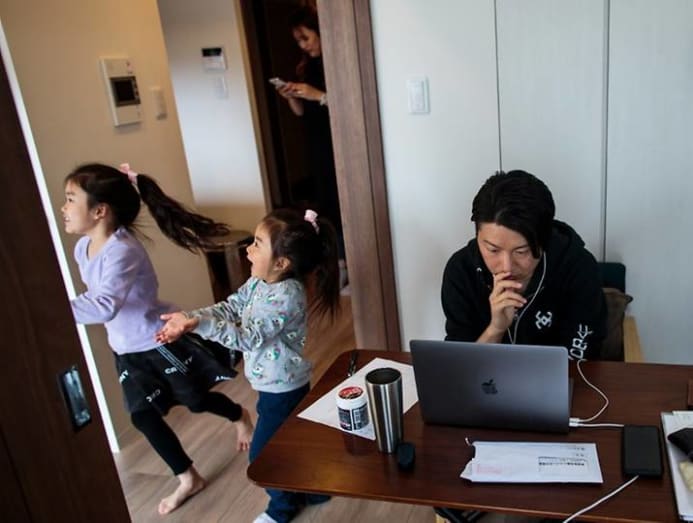Commentary: Why some workers in Singapore can’t wait to return to the office
SINGAPORE: In what must be unprecedented in piece of work history, Singapore has undergone the biggest piece of work-from-abode do, thanks to COVID-19.
What the Government struggled to encourage employers for years was achieved in mere weeks by the pandemic.
With companies forced to institutionalise work-from-home (WFH) or be penalised for not keeping to pandemic wellness rules, many scrambled to figure out how to comport business without any in-person interaction.
Information technology was a steep learning curve. Laptops replaced desktops, internet connectivity (and family unit relationships) were put through a thorough stress-test and everyone in the country now has a Zoom account. Without a lack of alternatives, nosotros were forced to adapt and soon institute in that location were huge benefits to WFH.
READ: Commentary: Why are some people less productive than others when working from dwelling house?
Nosotros saved on commuting fourth dimension and transportation costs. We worked in pyjamas and did less laundry. With flexible time, I could go to the gym at 9am and have tea at 3pm – and then long as my piece of work for the twenty-four hours was done.
Personal Finance Comparing site SingSaver did a calculation for two of their employees and found that working remotely helped them to save between S$400 to S$600 per month.
The benefits also extended to businesses as they cut back on office infinite.
DBS Bank plans to surrender about two and a half floors or 75,000 square feet in Tower 3 of the Marina Bay Financial Centre. Citigroup and Mizuho are also cutting space on the back of piece of work from habitation success.
READ: Commentary: Nobody wants to return to a five-day work calendar week equally it was
THE COSTS PILE Upward
But we demand to be clear-eyed about this dream scenario where everyone is productive and happy working out of their bedrooms. While the Regime announced work-from-domicile volition remain the default on Wednesday (Jul 7), many workers like myself are looking forward to the twenty-four hour period we can caput back to the part with no caveats.

For me, it was dealing with 4 children at home, toggling their abode-based learning requirements, space constraints and steady Internet connectivity that got me longing for my erstwhile role.
I experienced the terminal factor start-hand when there was a ability trip in the middle of a webinar I was delivering. This would never happen in the office – even if there was an outage, a backup generator would have kicked in.
The reality is most of us are not born multitaskers and demand altitude to focus. National Academy Wellness System's (NUHS) Mind Science Center did a survey in 2022 and found 61 per cent of those working from dwelling house reported feeling stressed, compared with 53 per cent of front-liners.
IT project manager Valerie Lim was one of the i,407 survey respondents. She was juggling work productivity, managing her son's home-based learning programme while keeping her younger daughter occupied.
With three of my kids in master school, I besides, similar Valerie, have inevitably taken on a teaching assistant role every weekday morn. On certain days, I get more than messages on Parents Gateway and ClassDojo combined than from my colleagues.
READ: Commentary: Surviving dwelling house-based learning in the long haul may require parents to dial back on kiasuism
Stress is not the only thing irritating folks jaded with working from dwelling. The space constraint is a major problem. When we first bought our flat in 2016, my wife and I planned our home infinite usage based on how nosotros wanted to alive, with piddling expectation nosotros would have to work in the verbal aforementioned identify.
I've had no choice but to work on the sofa, the dining table and fifty-fifty the bed when I needed to be in a tranquility space for a meeting - all of which are horrible for work. I learnt the difficult fashion this was no manner to work with a relapse of my back trouble later on sitting on the hard dining chair for four hours directly.
Information technology is little surprise senior principal physiotherapist John Abraham from Rapid Physiocare reported a significant increment in the number of WFH injuries since the circuit breaker.
ARE WE MORE EFFICIENT?
Sure, surveys show we are more productive when working from abode but I wonder if that is considering in saving time on commuting, we are only converting these extra hours into work. It is not uncommon for people to first at 8am and non leave until well past 7pm.
But while we can get more done simply because we are spending more hours working, are we actually more than efficient?
I find myself spending more time playing Whatsapp/slack/e-mail ping pong but to go a small task done. In the office, I simply walk over to my colleague and get things sorted in less than 10 minutes. The same exercise now can be equally long equally a tennis lucifer with a dorsum and forth of emails and messages.
READ: Commentary: Information technology's generally sociopaths who want to go back to the function
Experts take long said without face up to face communication, we have very footling to help us discern what the other person is trying to tell united states considering we tin can't come across expressions or hear tone of voice.
Without these clarifying cues, nosotros frequently "make full in the blanks" with assumptions and second-guesses which pb to unnecessary and time-consuming misunderstandings or miscommunications.

Overall, communication has become far more tedious in a WFH setting.
The other thing that has taken a large striking is ideation. The Zoom feel does non let people to raise their points apace (in that location is a born lag characteristic to forbid talking over each other). In that location'southward something about painting out ideas together on a whiteboard which make artistic ideas come up about more than hands.
This sense of collaboration and creativity died when are non in the room to argue, disagree and then come up to a consensus. Zoom meetings too are ofttimes dominated by the 1 person whose chore it is to get a project over the line.
READ: Commentary: Why almanac leave seems less restful without travel and what to do about it
Merely the most important thing we take missed greatly past not being in the office? Socialising.
Aristotle said that "Homo past nature is a social animal". Co-ordinate to a Julianne Holt-Lunstad, a professor of psychology and neuroscience at Brigham Young Academy, lack of social connection heightens health risks as much as smoking fifteen cigarettes a day or abusing booze. She also found that loneliness and social isolation are twice as harmful to physical and mental health equally obesity.
When I asked my LinkedIn contacts what they miss about the office, more than than 700 professionals said they can't wait to return to the office and a whopping 60 per cent confessed they missed socialising most of all.
About adults were lucky enough to experience this aspect of work life before COVID-19 hit. Far unluckier are recent graduates and new employees who have no hazard to meet their colleagues or speak to people along the corridor or in the pantry.
I realised how much I missed having lunch with colleagues – simply for an hour or two – to offload and discuss our shared experiences made the whole work experience better, one reason why I'm glad socialising with your colleagues in groups of five is allowed once again from Jul 12.
READ: Commentary: What if people don't want to render to the office?
Of form, COVID-19 won't disappear just because we have decided to live with it. And we volition still need to abide by safe direction measures in the workplace like the cap of 5 (lamentable sixth colleague) and to article of clothing masks all solar day.
Recently Apple sent a memo asking their employees to return to the office 3 times a week as America winds down its battle with COVID-19.
In response, some employees pushed back. Their alphabetic character started from a Slack channel for "remote piece of work advocates" with roughly 2,800 members.
The surprise is but 2 per cent of their workforce is insistent on non heading back to the office. For the other 98 per cent of Apple's full employees, peradventure, returning a few days a calendar week is a much needed desire to reset a most abnormal piece of work experience.
I for one, could really employ a proper desk and some peace and serenity from home - so I can work.
Adrian Tan is a Future of Piece of work Strategist at the Institute for Man Resource Professionals.
Source: https://cnalifestyle.channelnewsasia.com/commentary/work-from-home-stress-back-to-office-covid-19-271086
Post a Comment for "Commentary: Why some workers in Singapore can’t wait to return to the office"